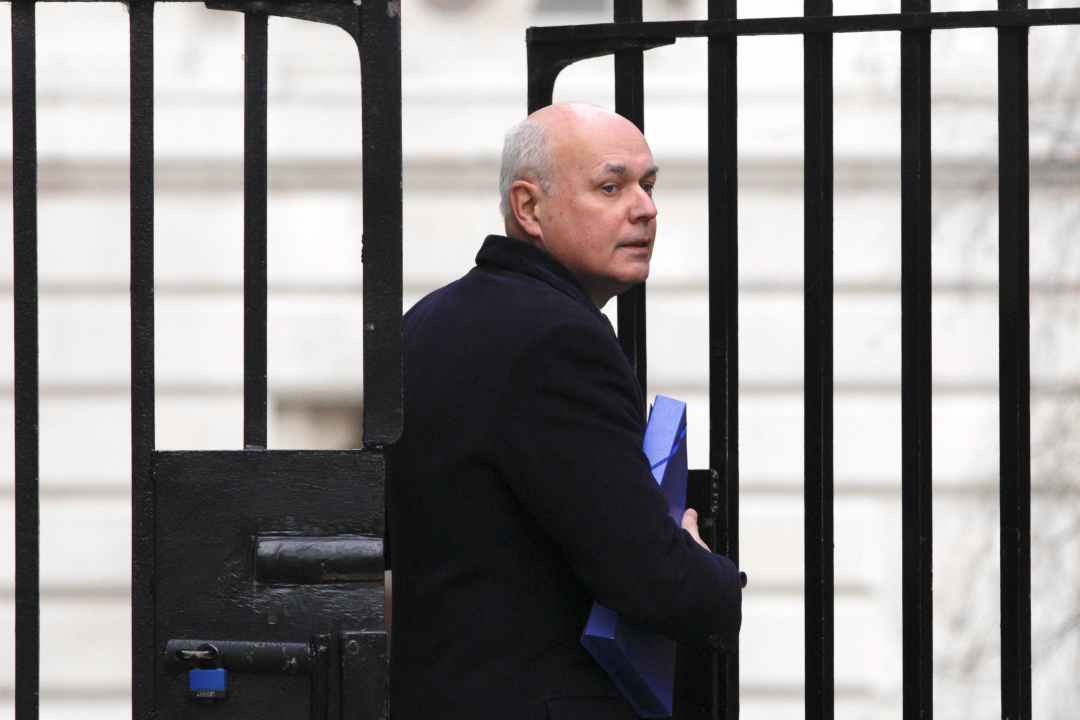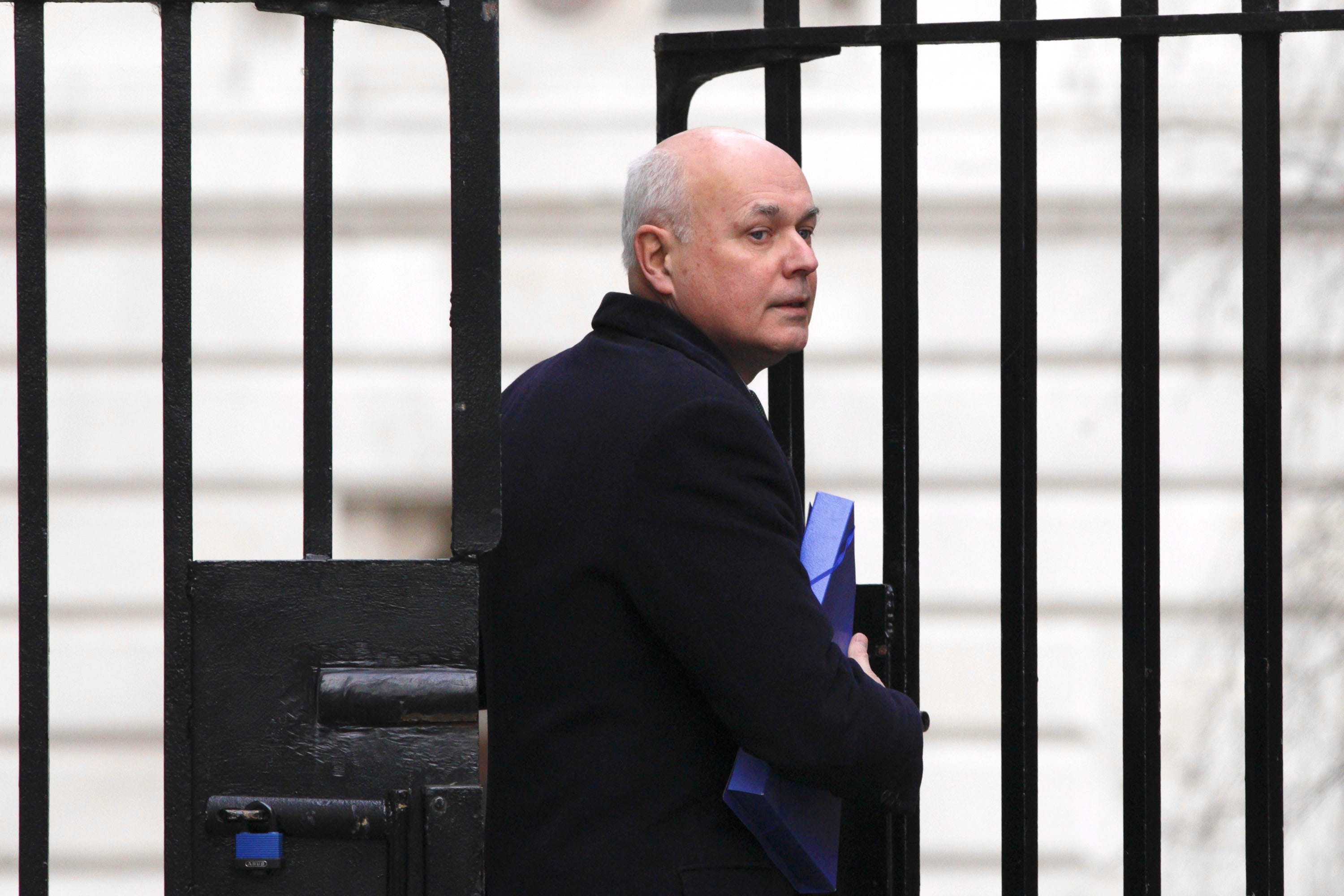Belatedly, the disastrous rollout of Universal Credit has become a media ‘talking point’. I could do with less praise for Iain Duncan Smith in the debate. He is the man the Tories decided was unfit to lead them, but still fit to manage and, as we are seeing, wreck the lives of the poorest people in the country. He deserves no special indulgence.
‘His intentions were good,’ everyone feels obliged to say. As if motives mattered more than deeds, and what politicians hoped for matters more than what they achieved. Duncan Smith’s achievement was to preside over disastrous and expensive experiments with IT systems that did not work, and then establish pilot projects for the new catch-all benefit, which was meant to end the complexity of the welfare state.
The point of pilot projects is to identify faults and remedy them. The Universal Credit pilot projects identified faults and ignored them. Although it was sold as a reform that would ‘make work pay’, the reality of Universal Credit is that single mothers and families where one adult is in work and the partner wants to find a job will be worse off.
There are ferociously complicated forms to fill in online. Rent is paid directly to the claimant and not to the landlord, putting people’s homes at risk. Worst of all, Whitehall assumed that every new applicant was in a salaried job and would receive a month’s pay in advance when they were ‘let go’. In reality many new claimants were unemployed or paid weekly and could not survive the six-week waiting period before their first Universal Credit payment arrived. Political pressure – rather than an honest acknowledgement of the realities of life for the 16 million people in Britain with savings of £100 or less – forced David Gauke (Duncan Smith’s successor) to make a minimal concession and offer emergency loans covering two weeks of benefit. That aside, Universal Credit is steaming ahead to be the main benefit for millions.
The scope for confusion and maladministration is mind-boggling. Waiting six weeks for money is bad enough if you have none. But such is the incompetence of the Department of Work and Pensions, about one fifth of claimants have to wait longer – three months in the worst cases. Housing associations, councils and private landlords are warning of a surge of evictions as Universal Credit spreads across the country . The disgraceful rise in rough sleeping – a problem Britain cracked under Labour – will only get worse. The sheer complexity of the system has already led Citizens Advice to say it has handled 100,000 complaints about Universal Credit – and has seen the equivalent of 12 per cent of all people receiving the benefit on the pilot projects.
We live under the rule of law. If the government denies people the benefits they are entitled to either because of blunders or malice, then it should face retribution in court. Yet the one thing Duncan Smith’s successors do not appear to fear is the judiciary.
The virtual abolition of legal aid justifies their complacency. Eighty per cent of the population was eligible in 1980. Today it is about twenty per cent. The government’s ‘reform’ of 2012 swept whole classes of law out of the reach of vast sections of society. The coalition wanted to save money. It is a testament to the scale of the denial of access to justice that it has cut far further than even Conservatives ministers intended. In a report for the Fabian Society, Lord Bach pointed out that the 2012 cuts were expected to save £450 million a year in today’s prices. Last year, legal aid spending was down £950 million.
Britain is not meant to run like this. The guinea pigs used in the Universal Credit pilot projects and the hundreds of thousands, maybe millions, of others likely to suffer as this ill-conceived and ineptly managed project slouches forward are meant to have legal redress.
If an employer had fired them, they would. In a magnificently-written judgement earlier this year, the Supreme Court quoted Magna Carta (always a good way to begin in England):
‘Nulli vendemus, nulli negabimus aut differemus rectum aut justiciam’, thundered Lord Reed, which as I am sure you know, translates as, ‘We will sell to no man, we will not deny or defer to any man either Justice or Right.’
The court went on to declare that the government’s decision to whack up employment tribunal fees to £1200 was unlawful because it denied victimised workers access to justice. (The number of cases coming to the tribunals dropped by four fifths after the ‘reform’.)
Every word of the judgement should apply to benefits’ claimants without the ability to contest Whitehall’s decisions. ‘The constitutional right of access to the courts is inherent in the rule of law.’ Courts and tribunals are not mere service providers. Stop access to them and you threaten the constitution. As Lord Reed said:
Parliament exists primarily in order to make laws for society in this country. Democratic procedures exist primarily in order to ensure that the Parliament which makes those laws includes Members of Parliament who are chosen by the people of this country and are accountable to them. Courts exist in order to ensure that the laws made by Parliament, and the common law created by the courts themselves, are applied and enforced. That role includes ensuring that the executive branch of government carries out its functions in accordance with the law.
In order for the courts to perform that role, people must in principle have unimpeded access to them. Without such access, laws are liable to become a dead letter, the work done by Parliament may be rendered nugatory, and the democratic election of Members of Parliament may become a meaningless charade.
For the life of me, I cannot see why these fine words do not apply with equal force to benefit claimants caught up in the omni-shambles of Universal Credit. If the denial of access to justice to sacked workers is unlawful, so too is the denial of the right of Universal Credit claimants to have their grievance aired. Ministers keep saying they have tested Universal Credit before imposing it on the country. Let us see how it stands up to the test of court hearings.








Comments